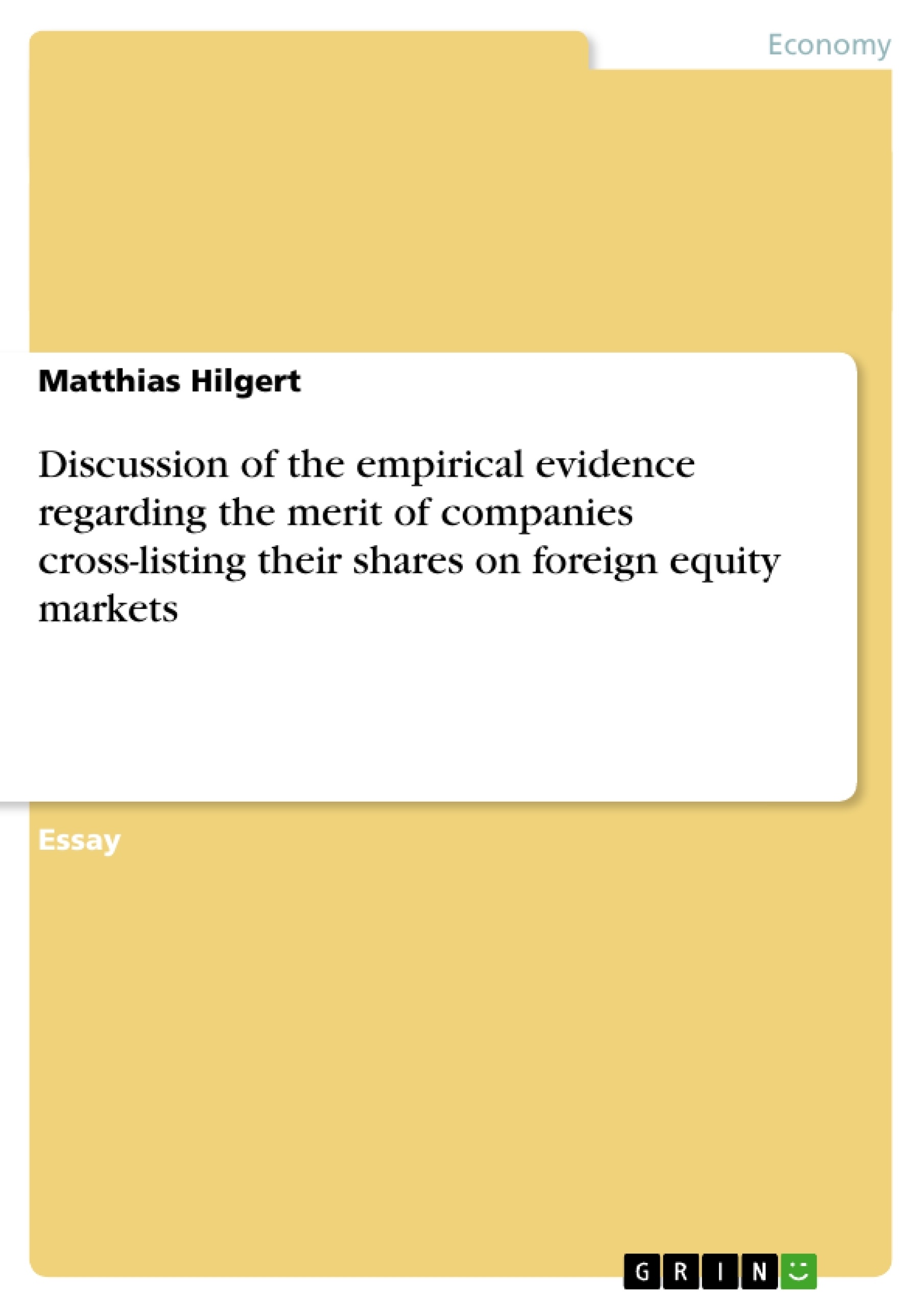Some non-American companies benefit from a US-listing and others do not even cross-list in the US. Several empirical studies show that foreign companies, which are listed in the US, are worth more. However, less than one out of 10 large public non-American companies float their shares in the US (Doidge et al., 2004). Why is cross-listing beneficial to some companies and not to others? In 1997 more than 4,700 companies were internationally cross-listed. But, during the past several years this number decreased significantly by 50% to 2,300 (end of 2002) companies (Karolyi, 2004). Today more and more foreign companies acknowledge that they cannot cross-list in the US. Moreover, some companies admit that they are no longer even willing to cross-list, because of the high costs and strict requirements (Economist, 2005). Still, there must be a benefit for some to cross-list. A number of studies point out that the benefits regarding cross-listing include a lower cost of capital, access to foreign capital markets, an extended global shareholder base, greater liquidity in the trading of shares, publicity, visibility and prestige. On the other hand, these companies face costs, which might erode the benefits. Typical costs associated with a US-listing are the SECreporting, reconciliation of financial statements with home and foreign standards, direct listing costs, compliance requirements, exposure to legal liabilities, taxes and various trading frictions as well as investment banking fees (Karolyi, 2004 and Doidge et al., 2004). This essay aims to examine the empirical evidence regarding the merit of cross-listing shares on foreign equity markets, especially listing shares in the US. First, it critically reviews the conventional wisdom. Secondly, it examines the new approach of the cross-listing premium. Finally, it ends with a summary of this project and my own opinions.
Inhaltsverzeichnis (Table of Contents)
- Introduction
- Critical Review of the Conventional Wisdom
- Global Risk-Sharing
- Access To More Developed Capital Markets
- Information Disclosure
- Bonding and Monitoring
- A New Research Initiative: The cross-listing premium
- The Model
- Data and Hypothesises of the Model
- Results
- Conclusion
Zielsetzung und Themenschwerpunkte (Objectives and Key Themes)
This essay examines the empirical evidence regarding the merits of cross-listing shares on foreign equity markets, particularly in the US. It critically reviews the conventional wisdom surrounding cross-listing benefits and examines the new approach of the cross-listing premium. The essay aims to understand why some companies benefit from cross-listing while others do not, and it explores the factors that contribute to the decision.
- Cross-listing benefits and costs
- Conventional wisdom on cross-listing motivations
- The role of global risk-sharing in cross-listing decisions
- The impact of information disclosure on cross-listing
- The cross-listing premium and its implications
Zusammenfassung der Kapitel (Chapter Summaries)
- Introduction: This chapter introduces the topic of cross-listing, providing an overview of the phenomenon and highlighting the existing debate on its benefits and drawbacks. It emphasizes the significance of understanding why some companies benefit from cross-listing while others do not, despite the potential advantages.
- Critical Review of the Conventional Wisdom: This chapter examines the conventional wisdom surrounding cross-listing by analyzing four key hypotheses: global risk-sharing, access to more developed capital markets, information disclosure, and bonding and monitoring. It explores the arguments for and against each hypothesis, presenting evidence from existing literature.
- A New Research Initiative: The cross-listing premium: This chapter introduces a new research initiative focusing on the cross-listing premium. It outlines the model used to analyze the premium, describes the data and hypotheses, and presents the key findings of the research.
Schlüsselwörter (Keywords)
The primary focus of this essay is on the empirical evidence regarding the merits of cross-listing shares on foreign equity markets, particularly in the US. The key concepts explored include cross-listing, cost of capital, global risk-sharing, access to developed capital markets, information disclosure, bonding and monitoring, and the cross-listing premium.
Frequently Asked Questions
What is cross-listing in foreign equity markets?
Cross-listing occurs when a company lists its shares on one or more foreign stock exchanges in addition to its home exchange, often to access larger capital markets like the US.
What are the main benefits of listing shares in the US?
Key benefits include a lower cost of capital, increased liquidity, access to a broader global shareholder base, and enhanced prestige and visibility.
What are the typical costs associated with a US listing?
Companies face high costs for SEC reporting, compliance with strict legal requirements, reconciliation of financial statements, and significant investment banking fees.
What is the "bonding hypothesis" in cross-listing?
The bonding hypothesis suggests that by listing in a market with strict regulations (like the US), a company "bonds" itself to higher disclosure standards, which can protect minority shareholders and increase company value.
Why has the number of cross-listed companies decreased since 2002?
Many foreign companies now find the costs and strict regulatory requirements of US exchanges too burdensome, leading some to delist or avoid cross-listing altogether.
- Citar trabajo
- Matthias Hilgert (Autor), 2005, Discussion of the empirical evidence regarding the merit of companies cross-listing their shares on foreign equity markets, Múnich, GRIN Verlag, https://www.grin.com/document/38178



